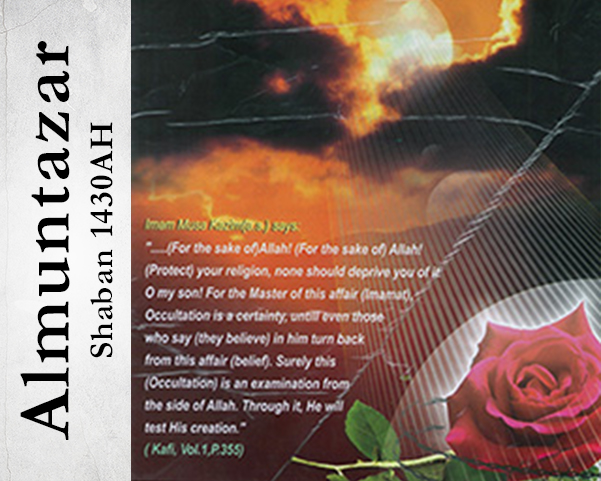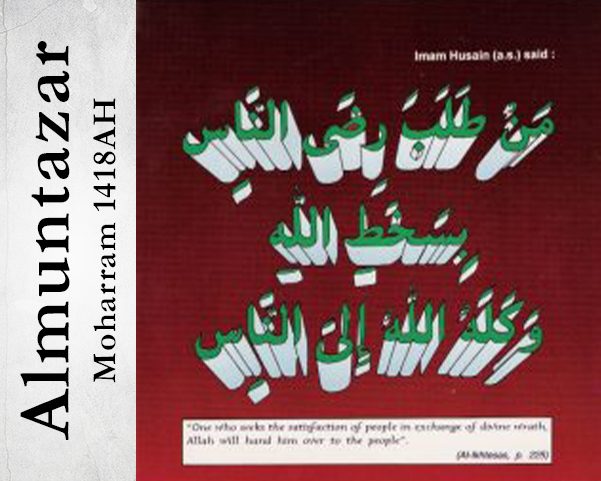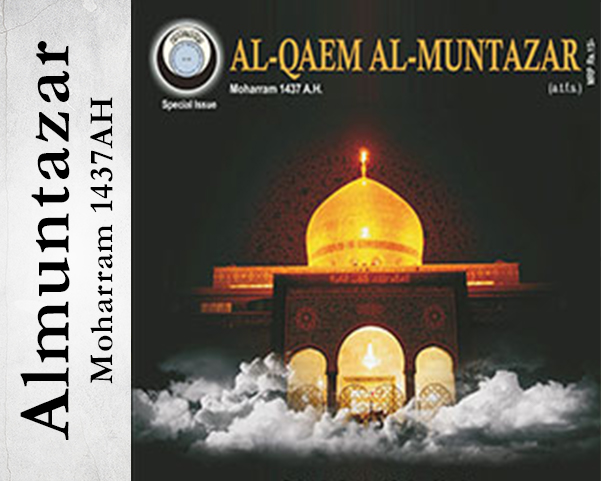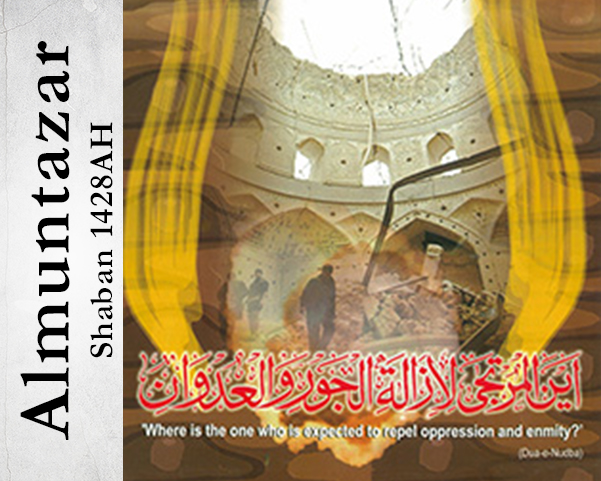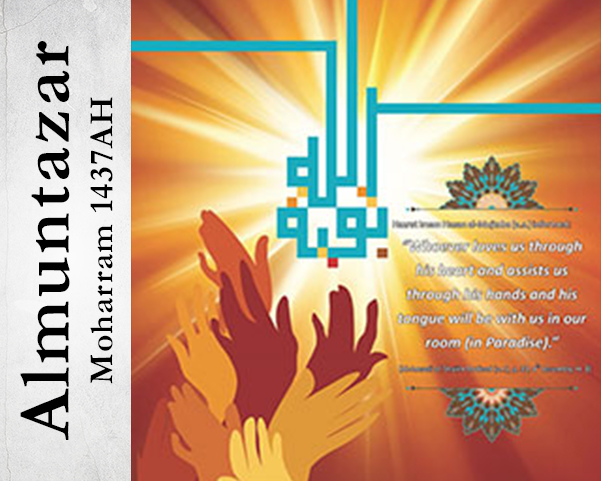If we look at Islamic history minutely, we observe that the period prior to the event of Karbala was the beginning of Islam and its propagation whereas post Karbala is the period of Islam’s survival. Islam had surely arrived but its enemies always tried to eradicate it since its advent. It is only the event of Karbala that exposed the enemies of Islam and till the end of this world it clearly demarcated the friends from the foes. The aim of this article is not to mention the details of enemies and foes. However, we shall briefly discuss a few incidents of atrocities upon the captives of Karbala especially Janabe Zainab Bint Ameeril Momineen (s.a.) and how she – in order to defend the religion of her grandfather Muhammad Mustafa (s.a.w.a.) and the martyrdom of her brother Imam Husain (a.s.) – propagated the message of truth to the enemies.
Before we arrive at the topic it is important to know the routes through which the caravan of hostages passed through, on their way from Karbala to Syria.
There are three routes to Kufa and Syria and certainly the caravan must have been taken from any of the three routes. The shortest route is that of ‘Baadiyah al-Shaam’ which is approximately 800 kilometers. The second route from the shore of river Euphrates, and sometimes one has to pass through the river, is 1200 kilometers. The third route which is the longest is 1600 kilometers and passes through various cities like Tikrit, Mosul, Nasibiyen, Aleppo, etc. If we look at this route today, it passes through a few countries. There is another route Sultani which is 1545 kilometers. There is no reliable history nor direct traditions of Ahle Bait (a.s.) about captives been taken from a particular route. However, whatever is available in a few books is from inadequate evidences and scattered sources. Apart from this, few incidents and unreliable events have been mentioned in unverified books and thereafter have been quoted in other books.
Nevertheless, what is worth noting is that in few incidents the captives of Karbala meeting different people in various cities have been mentioned in reliable books. Therefore based on this, the route of ‘Baadiyah al-Shaam’ can be given preference over other routes. Another reason for the same is that the Umayyad government had predicted that through the bold and brave sermons of Imam Sajjad (a.s.) and Janabe Zainab (s.a.) immediately after Aashuraa their oppression and tyranny will be exposed, hence the government decided that the captives meet minimum people and the route of ‘Baadiyah al-Shaam’ is less populous with no major cities on its way.
Now to the main topic of discussion after this brief introduction. Kufa is an important city in the route from Karbala to Syria.
Towards Kufa
In the afternoon of 11th Muharram 61 A.H, the caravan of Ahle Bait (a.s.) left for Kufa from Karbala. Imam Zain al-Abideen (a.s.) was the Imam of the time. He was responsible for all the affairs of the caravan and it was obligatory on everyone to follow him. The eldest amongst the Ahle Bait (a.s.) in this caravan was Janabe Zainab (s.a.) who was responsible for not just the protection of Imam since he was ill but also the entire caravan and thus she was the leader of the caravan. We cannot imagine the emotional condition of the women and children who had borne the difficulties and sorrow of the day of Aashuraa and witnessed heart rendering events such as seeing the trampled bodies of their loved ones. It was not easy to handle them in this condition but history is a witness that Janabe Zainab (s.a.) handled them with amazing dignity.
The corpses of Imam Husain (a.s.) and his companions were left unshrouded. Umar ibn Saad (l.a.) sent Ahle Bait (a.s.) to Kufa. The womenfolk, children, slave girls and Imam Sajjad (a.s.) were mounted on the barebacked camels. Kamil Bahai has written that there were twenty women and Imam Baqir (a.s.) who was four years old was with Imam Sajjad (a.s.). Allah protected both of them.
[Nafas al-Mahmoom, chapter 5, p. 209]The Adversities of Imam Sajjad (a.s.)
Heads of the martyrs were raised on the spears. Imam Sajjad (a.s.) says that when the ladies of Ahle Bait (a.s.) and other women were mounted on camels and sent to Kufa, I saw the corpses of martyrs on the ground smeared in blood. It was very difficult for me. I was extremely disturbed and distressed by what I was seeing and I was about to die when my aunt Janabe Zainab (s.a.), seeing my condition of grief and sorrow, consoled me: “O the remnant of my grandfather, my father and my brother! You are in such a critical condition; will you give away your life?” I said: “(O Aunt) why do I not be distressed? How can I be patient? I am seeing my chief and my master, my brothers, my uncles and my relatives smeared in blood. Their clothes have been looted and there is no one to shroud them and bury them. No one is near them and no one is with them. It seems people do not consider us Muslims.”
The narrator of good tidings: Janabe Zainab (s.a.)
Looking at this pain of Imam Sajjad (a.s.), Janabe Zainab (s.a.) said: “These things should not trouble you. It is a promise of Holy Prophet (s.a.w.s.) to your grandfather Imam Ali (a.s.), your father Imam Husain (a.s.) and your uncle Imam Hasan (a.s.), and Allah has taken covenant from a group in this nation that the Pharaohs of the world would not recognize them but the angels of the heavens surely will. They will gather their scattered bones and bury their blood-soaked bodies and will establish a sign of your father’s grave, the Chief of Martyrs, in this land (Karbala) whose effect will never fade away and will not perish with the passage of days and nights. The proponents of disbelief and the avatars of deviation will be inclined to destroy it. Yet it will emerge stronger and this mission will progress i.e. its altitude and prominence will keep increasing.
[Nafas al-Mahmoom, chapter 5, p. 210]Note: This tradition is from the rare narrations and miracles of the infallible Imams (a.s.). It is recorded in books. Over 1350 years have passed but the prophecy of Janabe Zainab (s.a.) has come true and accurate.
Janabe Zainab (s.a.) in Kufa
Shaikh Mufeed (a.r.) and Shaikh Tusi (a.r.) have narrated from Khuzlam bin Sateer who reported, “I reached Kufa in Muharram 61 A.H. and at the same time Ali Ibn Husain (a.s.) along with the ladies and children of Ahle Bait (a.s.) were brought to Kufa. The army of Ibn Ziyad (l.a.) had surrounded them. People of Kufa had come out of their houses to witness the scene. When Ahle Bait (a.s.) were brought into Kufa on saddleless camels, the ladies of Kufa became emotional and cried. I saw Ali ibn Husain (a.s.), who looked severely ill and weak, shackled. His hands were tied to his neck. He (a.s.) whispered slowly ‘Are these women crying for us? Then who killed us?’
Janabe Zainab (s.a.) commenced her sermon. By Allah! I have never seen a woman chaster, purer, more eloquent and articulate than Janabe Zainab Bint Ali (s.a.) who spoke in her father Ameerul Momineen’s (a.s.) tone and tenor. In that chaotic atmosphere, where clamors were erupting from all around, she indicated to the people to remain quiet. Silence gripped everyone. The sound of the camel bells stopped and people just stood where they were. She praised Allah and sent salutations on Holy Prophet (s.a.w.a.). She continued:
“O Kufans! O men of vaunt! O treacherous men! O retreaters! Do you weep for us and is this wailing and weeping of yours for us? May Allah never cease your lamentation! May your wailing never end! Verily, your similitude is that of a woman who unwinds the threads spun strongly by herself. You spun the rope of faith then untied it with your own hands and turned to disbelief. You do not have any good habits or characteristics. You are pretentious, self-conceited and are camouflaging your customs. Your similitude is of that of the vegetation which is grown on dirt or the whiteness in the graveyard. You have sent a grievous provision for your hereafter and have bought for yourselves hell forever. Are you crying for us while it is you who have killed us? By Allah you should cry a lot and smile a little because you have earned eternal disgrace, humiliation, fault and dishonor. This stain of disgrace and humiliation cannot be cleansed with any water. The murder of the beloved of the last Prophet and leader of the youths of Paradise (a.s.) cannot be recompensed. You have killed the one who was a shelter for the virtuous amongst you. They sought refuge in him in times of difficulty and problems and learnt religion and its laws from him. Curse be upon you for you have committed a grave sin and have become hopeless of the Mercy of Allah. You have transacted loss in this world and the hereafter and have become deserving for the punishment of Allah. You have bought degradation and dishonor for yourselves and your hands will be severed.
Woe be unto you O people of Kufa! How you have cut into pieces the beloved of Holy Prophet (s.a.w.a.), uncovered the veiled house, shed blood of their chosen progeny and violated their honor? Your utmost disgraceful act has made the earth shrink and the sky distant. The sky has wept blood because of your actions. Beware! Whatever consequences you face in the hereafter will be much greater than its effect in this world. Do not be proud on the respite that you have been given because Allah does not haste in taking revenge and He does not fear that the time to take revenge shall pass away. Certainly Allah is observing the sinners.”
The narrator says that the daughter of Fatima Zahra (s.a.) became silent and I saw that the people were stunned, weeping and biting their fingers. I saw an old man, whose tears had made his face and beard wet, saying:
“Their aged ones were the best aged ones and when their progeny is enumerated, they will not be hopeless and dishonored.”
[Muntaha al-Aamaal, vol. 1, p. 410; Al-Ehtejaaj, vol. 2, p. 110; Jilaa al-Uyoon, chapter 5, p. 410]As per the tradition mentioned in Al-Ehtejaaj, it is mentioned that Imam Ali ibn Husain (a.s.) said: “O Aunt! Please be silent. The people remaining should derive lessons from the ones gone by and by the grace of Allah you are learned without a teacher and wise without a preacher. Crying and wailing will not be able to stop the proceedings.” Janabe Zainab (s.a.) kept quiet.
The translation of this eloquent and well-articulated sermon is a difficult task for litterateurs because this sermon has been delivered by the daughter of Ameerul Momineen Imam Ali (a.s.) i.e. Janabe Zainab (s.a.) and those who listened to this sermon thought as if Ali (a.s.) himself is delivering the sermon. We have referred the following books for its translation:
- Al-Luhoof by Syed ibn Tawoos (a.r.)
- Al-Ehtejaaj by Shaikh Jaleel Abu Mansoor Ahmed bin Ali bin Abi Talib Tabrisi (r.a.) – Persian
- Jilaa al-Uyoon by Allamah Majlisi (r.a.) – Persian
- Muntaha al-Aamaal by Marhoom Shaikh Abbas Qummi (r.a.)
- Dam’ al-Sujoom translation of Nafas al-Mahmoom by Shaikh Abbas Qummi (may Allah sanctify his grave). Persian translation by Aga Haaj Mirza Abul Hasan Sha’raani
Since the translation was difficult it is important to note that while translating the context we have translated a few sentences verbatim. In the terminological translation, we have changed the words but kept the meaning intact.
Note: The titles that Imam Zain al-Abideen (a.s.) has used for Janabe Zainab (s.a.) shows her greatness and splendor and proves that she has been satiated with the spring of divine revelations. Her knowledge was superior to human knowledge. She was raised in the school of Wilayat. Her heart was illuminating with the light of knowledge and recognition.
Another thing worth noting is that Janabe Zainab (s.a.) was cognizant of that society. She showed the mirror to the people of Kufa. She learnt this skill too from her father. One of the famous Arabic anthropologists says: Ameerul Momineen (a.s.) spoke as per the types and habits of the people and the eloquent sermon of Janabe Zainab (s.a.) was similar to her father.
[Nafas al-Mahmoom, p. 215]The sermon of Janabe Zainab (s.a.) brought a revolution in the hearts of the Kufans and they were ashamed of their deeds. She mentioned about those atrocities which the enemies inflicted upon the Ahle Bait (a.s.) in Karbala. She made people aware of the oppressions. The revolution was a result of this sermon which avenged the blood of martyrs of Karbala and ended the rule of Bani Umayyah.
Janabe Zainab in the Royal Palace (Qasr al-Imaarah)
Qasr al-Imaarah is also known as Daar al-Imaarah. It was a building situated behind the mosque of Kufa. Presently, only a few foundation walls remain. This building was constructed by Saad bin Abi Waqqas in 17 A.H. after the construction of Masjid al-Kufa. Those who perform Ziyarat in Iraq and visit the house of Ameerul Momineen (a.s.) in Kufa, when they stand facing the door of the house they can see the remains of this palace on the left hand side. In short, this building was like a royal palace. Janabe Muslim bin Aqeel (a.s.) was martyred in this palace in the year 60 A.H. and the head of Imam Husain (a.s.) along with the captives of Karbala were brought here in 61 A.H. Ubaidullah ibn Ziyad (l.a.) was killed in the same palace in 66 A.H. Mokhtar Ibn Abu Ubaidah al-Saqafi was killed here in 67 A.H. and so was Mus’ab Ibn Zubair (l.a.) in 71 A.H.
It is said that when Mus’ab killed Mokhtar, Abdul Malik ibn Marwan (l.a.) came to Iraq, defeated him, took over the palace and the head of Mus’ab was placed in front of him. An Arab whose name was ‘Abu Muslim An-Nakhai’ stood up and said to Abdul Malik:
“I saw that the severed head of Imam Husain (a.s.) was kept in front of Ibn Ziyad (l.a.) here, then after a few days the head of Ibn Ziyad (l.a.) was kept in front of Mohktar at the same place. Later the head of Mokhtar was kept in the front of Mus’ab at the same place and now I see the head of Mus’ab in front of you”. It is said that Abdul Malik was terrified and ordered to vacate and destroy the palace. Thus, it was demolished and the filth of entire Kufa was dumped here.
“Seek lessons from it O people of intellect.”
This was same Daar al-Imaarah which we refer to as the palace of Ibn Ziyad (l.a.).
When Ubaidullah Ibn Ziyad (l.a.) got the news of arrival of Ahle Bait (a.s.) in Kufa, he ordered everyone to be present in the palace. Hence his palace was filled with the civilians and villagers. Since, in this article we are discussing only about Janabe Zainab (s.a.), we are not covering other incidents that occurred in the palace like Ibn Ziyad (l.a.) offending the head of Imam Husain (a.s.) and threatening to kill the companion of Holy Prophet (s.a.w.a.) Zaid Ibn Arqam, etc. and shall only discuss Janabe Zainab (s.a.).
Debate with Ibn Ziyad (l.a.)
The narrator says that when the family of Imam Husain (a.s.) was brought like prisoners of Rome in the accursed and damned gathering, Janabe Zainab (s.a.) entered like a stranger and sat in a corner while the other ladies sat surrounding her. Ibn Ziyad (l.a.) asked that about the lady who was sitting with her maids in the corner. No one answered so he asked again. None replied. When he asked for the third time, someone said that she is Janabe Zainab Bint Fatima (s.a.), the granddaughter of the Holy Prophet (s.a.w.a.). Ibn Ziyad (may Allah confine him to the lowest levels of Hell) addressed Janabe Zainab (s.a.) and said “All thanks to Allah who dishonored you and revealed your truth”. Janab Zainab (s.a.) responded:
“Praise be to Allah who honored us by means of the Prophet (s.a.w.a.) and purified us from all sorts of impurities and dirt. Humiliation is for a transgressor and a corrupt person resorts to lies. By the Grace of Allah, we are not among those but they are some other people.”
Ibn Ziyad (l.a.) said: Did you not see what Allah has done with you Ahle Bait (a.s.)?
Janabe Zainab (s.a.) retorted: “These are ones for whom Allah had chosen martyrdom and hence they went towards their resting places readily. I have not seen anything but goodness. Allah will gather them and you will argue with them. Then you see that who is honored and successful, O Son of Marjanah! May your mother weep over you!”
Amr bin Hurais says that says that Ibn Ziyad (l.a.) became so annoyed and angry after this discussion that he would have actually killed Janabe Zainab (s.a.). One of his courtiers said: O Ameerul Momineen, she is a lady and it is not necessary to reply to women. When Ibn Ziyad (l.a.) could not reply, he said “the murder of your rebellious brother and his defiant household has cured my heart”. Janabe Zainab (s.a.) became so emotional that she wept and cried out “You have killed our chief, cut off our roots and branches and uprooted our foundation. If your cure was in it then indeed you have been cured.”
Ibn Ziyad (l.a.) exclaimed, “This lady is a rhymester and I swear upon myself that her father was also the same and a poet” Janabe Zainab (s.a.) said: “I am not in a condition and I don’t have time for rhyme.”
According to the narration of Ibn Numa, Janabe Zainab (s.a.) said: “I am surprised at the one who gets cured by killing his leaders while he knows that they will avenge it in the hereafter.”
After this the accursed turned to Imam Sajjad (a.s.)
[Nafas al-Mahmoom, pp. 226 to 323; Jilaa al-Uyoon, p. 718]This is how the daughter of Imam Ali (a.s.) humiliated Ibn Ziyad (l.a.) with her courage and bravery in front of his courtiers and exposed the oppression committed against the family of the Prophet (s.a.w.a.). Ibn Ziyad (l.a.) had gathered crowds to display his strength but he failed.
The incidents about the blessed head of Imam Husain (a.s.) and the detainees of Karbala are recorded in books. Wherever the head of Imam Husain (a.s.) reached people would cry and wail. The situation would turn radical. Since the accursed ones who carried the head of Imam Husain (a.s.) out of Kufa were afraid that Arab tribes may create a chaos and snatch away the head from them, they passed it from desolate areas and yet if they met any tribe on the way, they would say that these are heads of Kharijites (outcasts)
[Kaamil Bahai, vol. 2, p. 291]Few incidents which occurred on route to Syria from Kufa are as follows:
Miscarriage: One of the wives of Imam Husain (a.s.) was pregnant and but she miscarried on a mountain near Aleppo. The name of the child was Mohsin and is buried on that same mountain which is famous even today as ‘Mashhad al-Saqat’ and ‘Mashhad al-Raktah’
At one of the places one of the daughters of Imam Husain (a.s.) fell from a camel and cried out ‘O Aunt Zainab!’ When Janabe Zainab (s.a.) heard her cry, she looked around for her and saw that she was trampled under the feet of the camel and left for the eternal abode. Janabe Zainab (s.a.) expressed her grief “WA DHAY’ATAAH! WA GHURBATAAH! WA MUKHTARAAH”
Incident of the Monk
The manifestation of a miracle from the head of Imam Husain (a.s.) and the monk realizing it is a famous incident. This took place at a location near Aleppo called Qinnisireen.
[Muntaha al-Amaal, vol. 1, p. 419]Apart from these there are many other places where some incidents took place viz. Mosul, Nasibatain, Baalbek, Miyafariqain and Shayz, etc.
To conclude we shall mention the sorrow and grief of Imam Zamana (a.t.f.s.) through his holy grandmother, a scholar without being taught, Janabe Zainab (s.a.).
Marhoom Haaj Shaikh Akbar Ali Nihaavandi has mentioned in his invaluable book that the revered Shaikh Haaj Mulla Sultan Ali Rozakhwan Tabrizi (who was among the worshipers and penitents) narrates his dream that he was in the presence of Hazrat Baqiyatullah (a.t.f.s.) and said “O my chief and master, you have recited in Ziyarat-e-Naahiyah – I cry for you day and night and weep blood instead of tears; is it right?”
Imam (a.t.f.s.) said: Yes, it is correct. I inquired ‘Which is that calamity for which you weep blood instead of tears? Is it for Ali Akbar (a.s.)?’ He replied: “If Ali Akbar (a.s.) was alive even he would cry blood over this calamity”. I asked ‘Is it for Abbas (a.s.)?’ He (a.t.f.s.) answered: “Had Abbas (a.s.) been there even he would weep blood over this calamity”. I said ‘certainly it would be the calamity of the Chief of Martyrs (a.s.)’ He (a.t.f.s.) reacted “Had the Chief of Martyrs (a.s.) been alive even he would cry blood over this calamity”. I probed ‘Then which is that calamity?’ He (a.t.f.s.) responded “It is the calamity of Janabe Zainab (s.a.) being enslaved upon which tears of blood will always be shed.”
[Abqari al-Hesaan, vol. 1, p. 98]O Allah we ask you by the right of Janabe Zainab (s.a.) and the captives of Karbala, hasten the reappearance of Imam-e-Zamana (a.t.f.s.) to avenge the oppression upon them and disgrace and humiliate all the enemies of Ahle Bait (a.s.).










